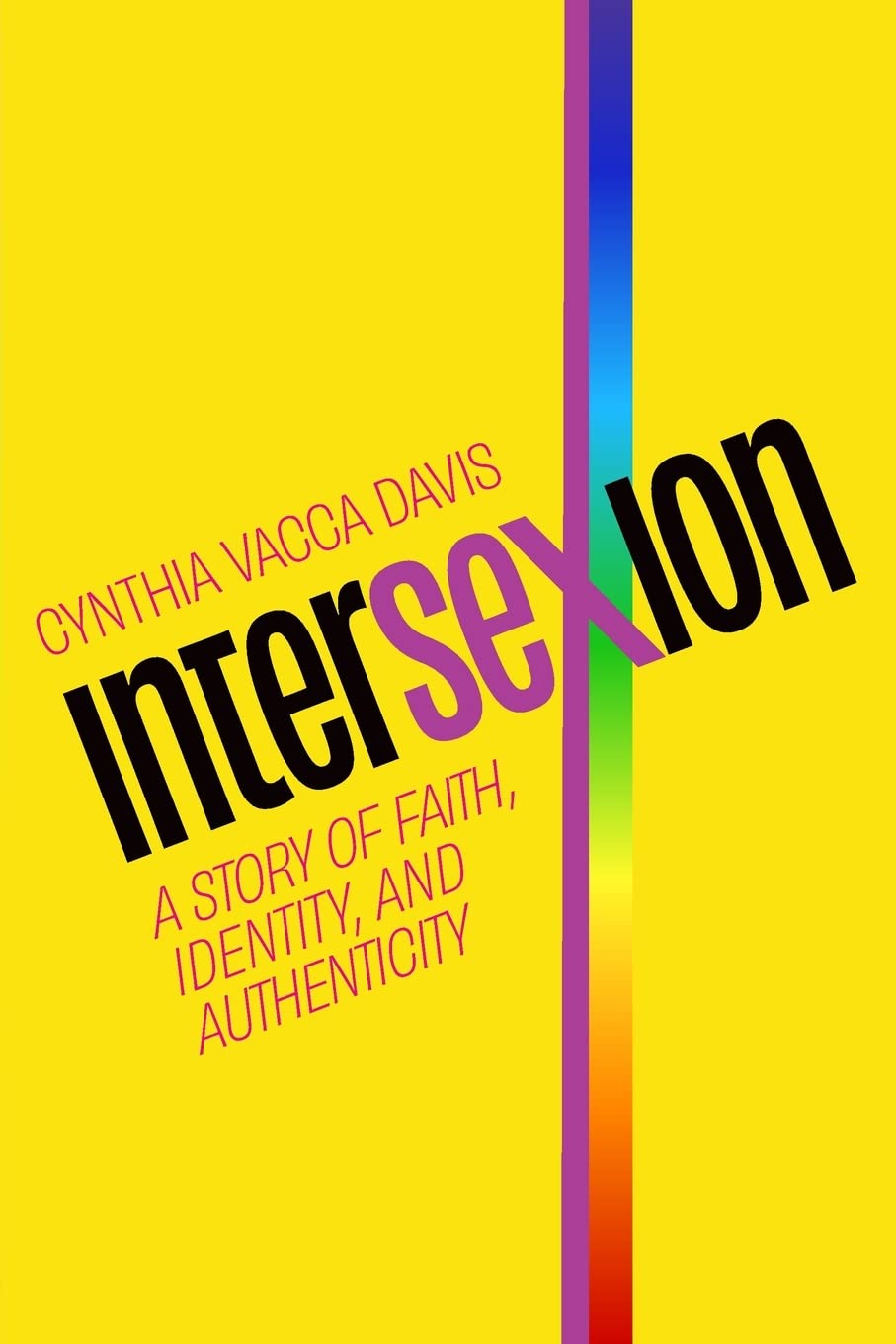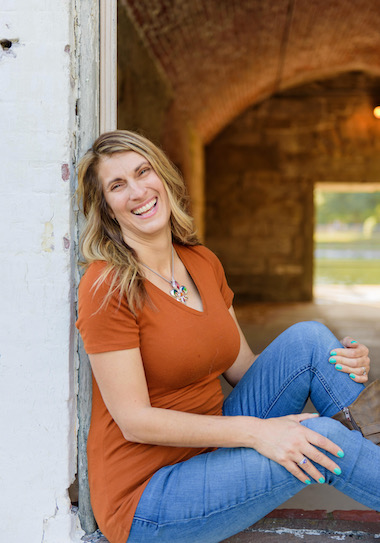By DAVID CRUMM
Editor of Read the Spirit magazine
Yes, as the cover of Cynthia Vacca Davis’s memoir proclaims, “sex” is a major theme in this book.
But if you read her title—Intersexion, A Story of Faith, Identity and Authenticity—all the way to the end, you’ll find another major theme of this book: Authenticy. And, beyond that, there’s a third major theme that matters deeply to millions of American people of faith these days: Community. The larger story within these 234 pages is about the fulfillment so many Americans are seeking in warmly embracing communities of faith.
The main narrative in this book describes the dramatic changes in Cynthia’s life through a close friendship at her church with Dani/Danny—who is part of a largely misunderstood gender minority and was going through even more titanic changes at the same time. As Dani moved toward embracing an authentic life as Danny, both Cynthia and Danny met the harshness of Evangelical exclusion. However, both of them refused to hide their own true stories in the shadows. Danny was experiencing physical and emotional changes as an intersex person and Cynthia was discovering the buzzsaws that friends of LGBTQ+ folks can face, as well.
Ultimately, that’s the reason millions of Americans should read this new book. Cynthia’s memoir tells us what it feels like inside the daily lives of both her friend and herself and their families—when faced with the harsh reality of Evangelical judgment. And, even though this particular book is about exclusion due to gender and sexuality, this echoes stories about exclusion due to race or ethnicity or simply an openness to questioning the almost fundamentalist doctrines held by many Evangelicals in America.
The most compelling reason to read this book—for most readers nationwide—is to learn what it feels like when people find themselves exiled from the iron gates of such rigid religious communities. There are millions of these refugees all across America, as we know from Pew Research. And, if you are not one of those refugees yourself, Cynthia’s book explains to the rest of us—including active members in the many churches that welcome minorities—that some of our Christian neighbors may be carrying profound wounds as they try to find new homes. Even as we extend a welcoming hand to these exiles, years may pass before those wounds heal, if ever.
Cynthia herself makes this case in the opening two paragraphs of a free downloadable-PDF she offers to folks who visit her website—CynthiaVaccaDavis.com. The PDF is a check list that she calls “5 Ways to Find Community after Leaving Church.” She writes in those opening paragraphs:
One of the biggest fears I had about walking away from church was losing my community. Church for me was never something I did halfway: It was a way of life. I was involved in church happenings multiple days each week. My social circle was derived almost entirely of people from our congregation. My emergency contacts? Church friends. Surrogate family for holidays? Again, church people. I couldn’t imagine how I would be able to rebuild community from scratch by myself. It was terrifying.
But the reality was way different than I feared. My social circle expanded exponentially after I stopped attending church. And the relationships I developed were deeper, richer, and more authentic than many of my Christian friendships had been. Although the process seemed organic and fairly effortless, in hindsight I can identify several shifts in my thinking and behavior that opened me to new and unexpected friendships.
These two paragraphs tell us a lot about Cynthia’s life and also the themes she explores in her new memoir. Among the details to note in these paragraphs: She’s still among the walking wounded. And, Cynthia assumes that the terms “church” and “Christian” refer to a kind of razor-edged, almost-fundamentalist Evangelical community. The fact is that, today, lots of mainline churches—and millions of Christians—fully welcome racial, ethnic and gender diversity. Her definition of “church” and “Christian” refer to claustrophobic circles in which she lived a lot of her life—and that will shape her worldview of those two terms for the rest of her life.
In an interview with Cynthia about her book, this week, she said, “As I began working with Danny on writing this book, I realized—and Danny realized—that writing our stories could be a gift to the larger community, giving people an authentic sense of what so many of us are going through. Of course, I realize there are other kinds of churches out there, but this book describes our church and our experience—because we know that so many others have had these experiences.”
The Lonely Curiosity of the Exiles
In our interview, I said to Cynthia: “You know one ray of sunshine related to your story is that, by and large, the battle for gender inclusion is all but over across America. There are still very active battlegrounds in states where conservatives are trying to chip away at civil rights. But overall, for example, a solid majority of Americans now support legal recognition of same-sex marriage and majorities also support a range of other LGBTQ rights. I live in Michigan, where our legislature finally voted, this month, to include LGBTQ rights in the state’s civil rights code. Yes, there are millions of former Evangelicals who are exiles precisely because of their concern for either their own gender identity or that of relatives, friends, coworkers and neighbors. It’s heartbreaking to think of so many people adrift because of religious bias. And, yes, there will continue to be heart-breaking battles for years to come—but that hard-edged Evangelical minority in America keeps shrinking each year.”
I said, “That’s a bit of a long-winded summary of the state of these issues—but the basic point I’m making is: Hopefully, the loneliness of the Evangelical exiles will be increasingly greeted by congregations with open doors and open arms. Do you think you might return to some kind of church?”
“I do think about this a lot,” Cynthia said. “I know there are churches out there right now who have very solid allies. But, because of what I’ve been through and what Danny’s been through, I don’t know if attending a brick-and-mortar church is in the future for me. I still don’t know if that will be possible for me in the future.
“Once we had made it through the kinds of experiences with church that we describe in this book, I think there’s a natural hesitancy about accepting the constant filter of a church again,” she said. “And, with this new freedom, I’m discovering new things to do with my Sunday mornings. I love my Sunday morning yoga, now, and I love meeting different people and trying different practices that are both meditative and are connected to community—just not inside a brick-and-mortar church.
“After my experiences, living outside those old boxes and walls is giving me something I’ve never experienced before and, right now, I want to explore that,” she said and paused for a moment before adding, “I do not want to say that I will never go back to church. But I am saying: Not now.”
She paused. Then, she added. “But ever? Church? For me? I do get curious.”
A Helpful Book for Caring Congregations
That is why, in my Amazon-book-page review of Cynthia’s book, I write:
This story does not end on a down note. The book’s concluding chapters describe the happier path these friends have charted beyond that insular world they once thought of as home. Although their story is grounded in the specifics of their own lives, their story mirrors that of millions of Americans who have walked away from Evangelical churches for a wide range of reasons, including racial, cultural and political biases that have become litmus tests in many churches.
This book is a great choice for individual reading or small-group discussion. At the moment, Cynthia is working on a discussion guide that she plans to post on her own website in coming months. Even if you are not part of the Evangelical world from which this book springs—this is an intimate and caring look at how lives are turned upside down by these all-too-common biases. That means this is a very helpful book for readers from more caring congregations, so they might be better prepared to welcome these battle-scarred folks into a healthier form of spiritual community.
I was pleased to hear from Cynthia’s publisher, David Morris of Lake Drive Books, that he agrees with my overall “take” on this book. That’s why he wanted to publish Cynthia’s memoir and that’s what he hopes readers will discover in these pages, he told me.
Here’s what David Morris said about the book: “As Cynthia went through all of these experiences she describes in her book, she realized that her community was at risk—and in some ways it was. She experienced some rejection and hard choices. But, through this process of deciding to be fully authentic and open, she found more connections, more community, than she had expected. What she discovered is that, once we are living authentically, our community may not look like what we thought it was going to look like. Our community can expand and change. And that’s true for so many of us these days—because our sense of community itself is growing and developing in this changing world.”
In my interview with Cynthia, I promised I would give her the last word in this story. Together, we chose the final paragraph of her new book as that last word:
“Danny taught me that being known is worth fighting for. It’s worth betting everything on. It’s risky. It’s terrifying. But it’s the only thing that matters. I don’t have all the answers, but what I do know is, for the rest of my life, anyplace I go—church, job or otherwise—it will be as me, authentically: insides and outsides all in alignment.”
.
Care to read more?
GET THE BOOK—Cynthia’s Intersexion is available on Amazon in paperback, Kindle and audio versions.
VISIT CYNTHIA ONLNE—Visit her website, CynthiaVaccaDavis.com.
MORE LAKE DRIVE BOOKS—Find books on similar themes at David Morris’s website for Lake Drive Books.
EXPLORE TWO LANDMARK BOOKS—These two books are landmarks in the effort to welcome LGBTQ Christians:
- Changing Our Mind by Dr. David Gushee
- And, Introducing Christian Ethics by Dr. David Gushee
MEET THE BIAS BUSTERS—Check out the 20 guidebooks to overcoming bigotry produced by the Michigan State University School of Journalism Bias Busters. Those books are available in Kindle and paperback editions. Volumes 12 and 14 in this series specifically explore sexuality and gender.
.
.


